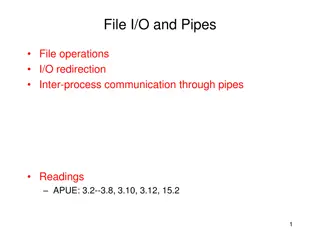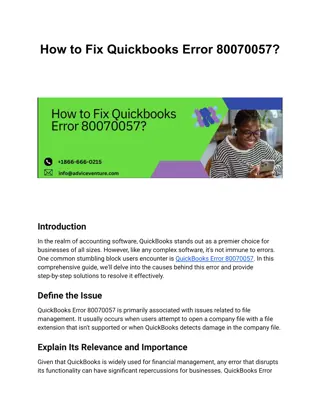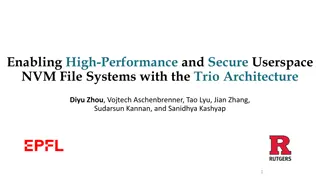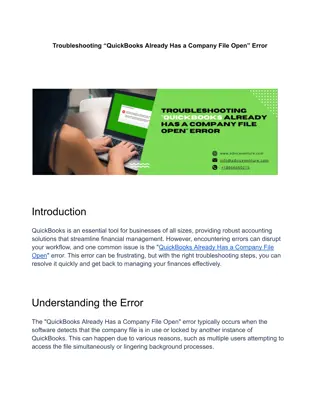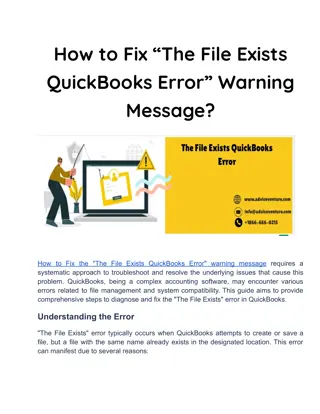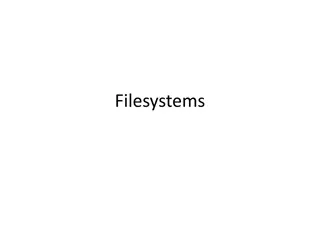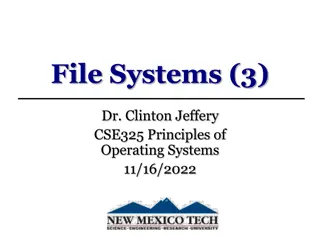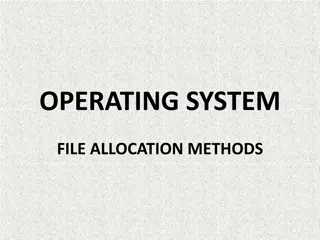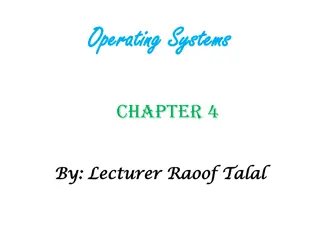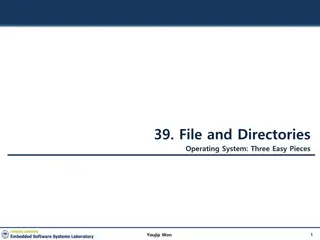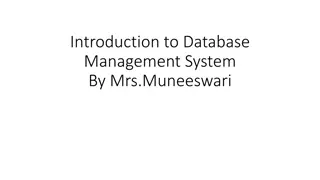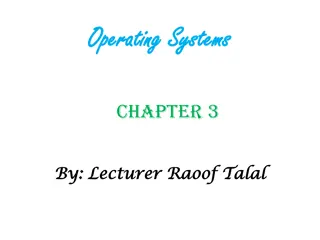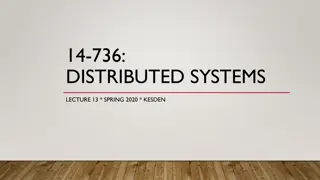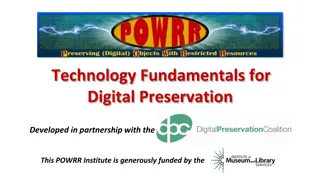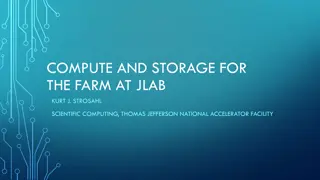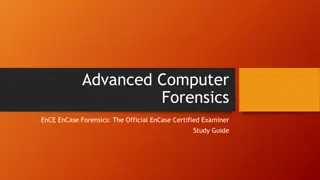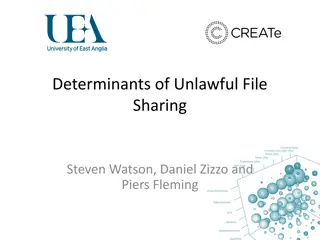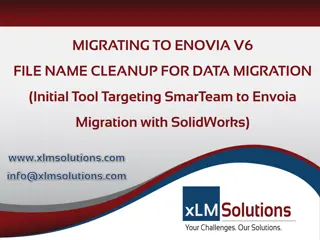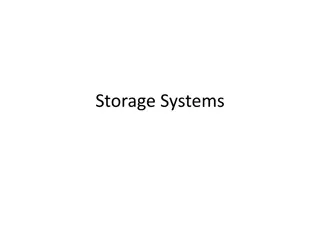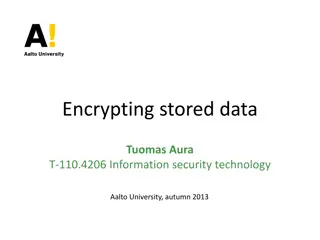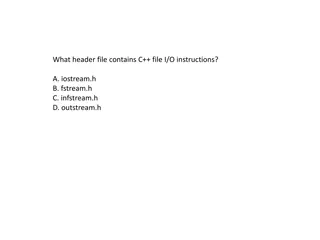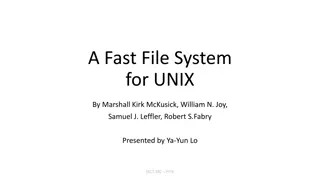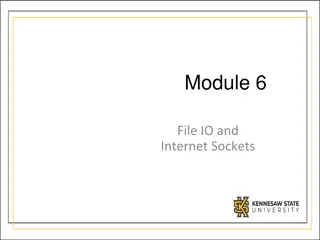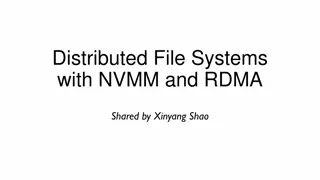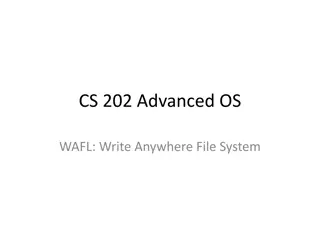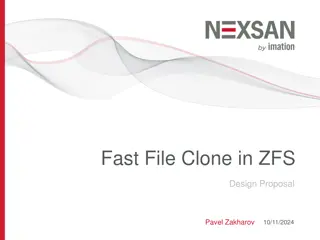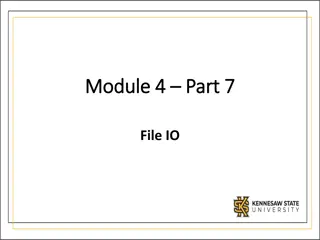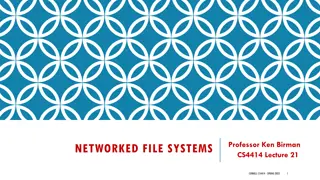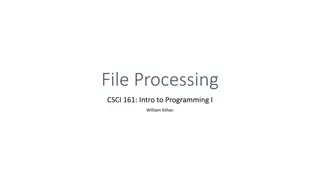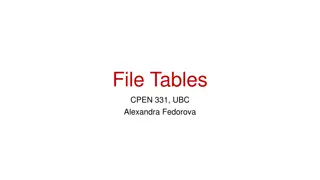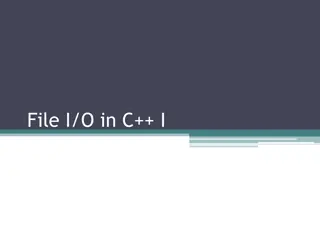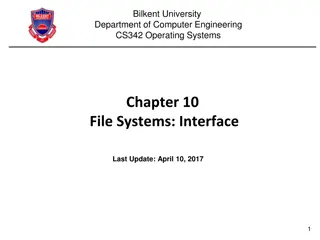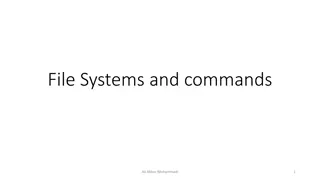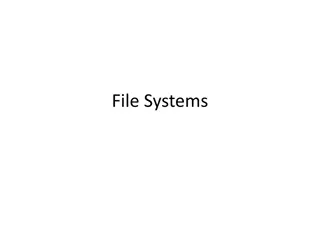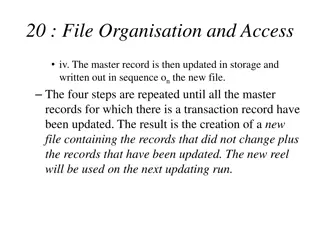Understanding File I/O and Inter-Process Communication Through Pipes
Delve into the intricacies of file operations, I/O redirection, and inter-process communication through pipes as discussed in the readings of "Advanced Programming in the Unix Environment" (APUE). Explore data structures for open files, file descriptor tables, implications of data structures, system
4 views • 18 slides
Faculty File Construction Workshop Year 2 Updates 2023
Explore the updates for the Faculty File Construction Workshop Year 2, including important resources, faculty plan requirements, and the purpose of decision file procedure. Learn about the required second-year file content and self-evaluation executive summary for faculty evaluation procedures at St
1 views • 18 slides
How to Fix Quickbooks Error 80070057?
How to Fix Quickbooks Error 80070057?\nQuickBooks Error 80070057 can disrupt financial management. It occurs due to file extension issues or data damage. Symptoms include inability to open files and error code display. Causes involve incorrect file extensions or firewall settings. Diagnostic tools l
1 views • 5 slides
Enhancing Userspace NVM File Systems with Trio Architecture
This study explores the utilization of LibFS as an efficient solution for enabling high-performance and secure userspace NVM file systems. LibFS offers direct access to NVMs, minimizes software overhead, allows unprivileged customization, supports private customization for individual applications, a
0 views • 37 slides
Troubleshooting “QuickBooks Already Has a Company File Open” Error
Troubleshooting \u201cQuickBooks Already Has a Company File Open\u201d Error\nEncountering the \"QuickBooks Already Has a Company File Open\" error? This common issue disrupts your workflow but can be fixed. Start by checking for multiple instances of QuickBooks and restarting your computer. Ensure
1 views • 6 slides
How to Fix “The File Exists QuickBooks Error” Warning Message
How to Fix the \"The File Exists QuickBooks Error\" warning message requires a systematic approach to troubleshoot and resolve the underlying issues that cause this problem. QuickBooks, being a complex accounting software, may encounter various errors related to file management and system compatibil
0 views • 5 slides
Understanding Filesystems: A Comprehensive Overview
File systems provide a structured approach to storing and organizing data on secondary storage devices. They involve logical organization of files, directories for grouping related files, sharing data between users, and managing permissions. Files contain data with attributes like size, ownership, a
3 views • 29 slides
Understanding File Allocation Strategies in Operating Systems
Explore various file allocation schemes like extent-based systems, linked allocation, file allocation table (FAT), indexed allocation, and combined schemes used in operating systems. Learn about their pros and cons, including details on maximum file size calculations based on disk block sizes and po
0 views • 20 slides
Operating System: File Allocation Methods
File allocation methods in operating systems determine how files are stored in disk blocks. The main methods include Contiguous Allocation, Linked Allocation, and Indexed Allocation. Contiguous Allocation involves allocating blocks in a contiguous manner for efficient disk space utilization and fast
0 views • 14 slides
Implementation of File System in Operating Systems
Various structures, such as boot control blocks and directory implementations, play a crucial role in implementing a file system in operating systems. These structures help in managing disk and in-memory data efficiently, ensuring effective file storage and retrieval. Linear lists and hash tables ar
1 views • 22 slides
Understanding File and Directory Operations in Operating Systems
Explore the concepts of files and directories in operating systems, including persistent storage, file systems, directory structures, creating and accessing files, and reading/writing file data. Dive into the foundational elements essential for managing data effectively on computer systems.
0 views • 34 slides
Introduction to Database Management System Explained
This presentation covers the basics of database management systems, including definitions of data, types of data, structured and unstructured data, storing data in computers using file systems and database systems, and issues with file systems like data redundancy, inconsistency, difficult data acce
1 views • 18 slides
Understanding the Implementation of XML Results File G for Exams in England and Wales
The XML Results File G is introduced as a new method to provide schools with additional exam data beyond overall results. Initially used by four boards, the file follows the A2C XML Schema for compatibility with SIMS7 and NextGen. While optional for now, the XML file naming convention and guidelines
1 views • 43 slides
Understanding File Concepts in Operating Systems
In the realm of operating systems, files are vital entities that store data in secondary storage. They consist of attributes like name, size, protection, and more. File operations such as creation, writing, and reading are performed through system calls. This chapter delves into the intricacies of f
12 views • 21 slides
Understanding Distributed File Systems
A distributed file system manages files across multiple machines on a network, providing users with a seamless experience as if they were using a local file system. This system abstracts details such as file locations, replicas, and system failures from the user, ensuring efficient and reliable file
0 views • 35 slides
Safety Director 101: The Driver Qualification File
The Driver Qualification (DQ) File is a critical element in safety programs, ensuring compliance with Part 391 Qualification of Drivers in the Federal Motor Carrier Safety Regulations. DQ files must be kept up-to-date with quarterly reviews, spot checks, new hire reviews, and policy updates. Buildin
1 views • 25 slides
Technology Fundamentals for Digital Preservation
This course covers common computer systems, file formats, open-source software, and the OAIS standard for digital preservation. Participants will learn about operating systems, file systems, and file format preservation issues. The course also explores the differences between Windows and Unix operat
1 views • 80 slides
Analysis of file:// Vulnerabilities in Android Browser Apps
The study delves into file:// vulnerabilities in Android browser apps, uncovering risks posed by the file:// URI scheme. It highlights how file:// requests can breach app data isolation, potentially compromising sensitive files. The research presents a unified attack model, FileCross automated testi
0 views • 22 slides
Compute and Storage Overview at JLab Facility
Compute nodes at JLab facility run CentOS Linux for data processing and simulations with access to various software libraries. File systems provide spaces like /group for group software, /home for user directories, and Cache for write-through caching. Additionally, there are 450TB of cache space on
0 views • 11 slides
Understanding File Systems and Disk Basics in Computer Forensics
Explore the fundamentals of file systems and disk basics in computer forensics, covering topics such as disk preparation, partitioning, volume creation, file system formatting, FAT basics, and file allocation tables. Learn about disk structures, cluster allocation, and the functioning of FAT version
0 views • 24 slides
Determinants of Unlawful File Sharing: Insights and Implications
This comprehensive review delves into the determinants of unlawful file sharing behavior, exploring factors such as proximity to actual behavior, financial and legal considerations, and the impact on sales. It discusses the reasons behind illegal file sharing, including the influence of laws, pricin
0 views • 15 slides
ENOVIA V6 File Name Cleanup for Data Migration
Problematic file names with unsupported characters can hinder data migration into ENOVIA V6, impacting object busname, titles, and filenames. This article proposes a solution involving filename changes, database updates, and file vault maintenance. The methodology includes SQL queries for analysis,
0 views • 5 slides
Information Systems in Organizations: Overview and Implementation
Information systems play a crucial role in organizations, encompassing transaction processing systems, functional area information systems, and enterprise resource planning systems. This content delves into the purpose of transaction processing systems, the support provided by information systems ac
0 views • 30 slides
Understanding File Systems and Storage Devices in Computer Systems
Learn about the abstraction on top of physical storage devices, including magnetic disks and flash memory, and how file systems provide useful abstractions to manage and store data effectively. Explore the performance characteristics, crash tolerance, and access control features of file systems, as
0 views • 43 slides
Understanding Data Encryption and File Security
Exploring data encryption and file security, covering topics such as scenarios for encryption, file encryption methods, limitations, and secure file deletion techniques. Highlighting the challenges of balancing security, usability, and reliability in computer systems.
0 views • 29 slides
Understanding C++ File I/O Operations
Learn about C++ file I/O operations, including input/output instructions, file handling with ifstream and ofstream, opening multiple files, checking end of file, and a review of the file I/O process. Discover how to write to an ASCII file and read data from it in C++ programming. Practice with examp
0 views • 47 slides
Evolution of UNIX File Systems: A Comprehensive Overview
This insightful presentation delves into the evolution of file systems in UNIX, starting from the traditional file system developed at Bell Labs to the more sophisticated approaches adopted at Berkeley. It highlights key issues faced by older systems, such as low throughput and scattered block alloc
0 views • 19 slides
Understanding File Input/Output in Java
Learn about file input/output operations in Java. Explore how to read and write data to files, handle exceptions using try/catch, work with streams, understand the process of file handling, and examine file structure examples like storing airline data. Enhance your Java programming skills by masteri
0 views • 41 slides
Exploring Distributed File Systems with NVMM and RDMA
This content delves into the integration of Non-Volatile Memory Modules (NVMM) and Remote Direct Memory Access (RDMA) in Distributed File Systems. It covers various aspects such as new hardware architectures, NVM concepts and technologies, Intel Optane DC memories, incorporation of NVM in memory and
0 views • 22 slides
Understanding WAFL: Write Anywhere File System in Distributed Systems
Explore the concept of WAFL in distributed systems, where appliances are preferred over general-purpose computers. WAFL addresses the unique requirements of NFS file servers, emphasizing fast performance, support for large file systems, and efficient write operations through Copy-on-write snapshots.
0 views • 27 slides
Fast File Clone in ZFS Design Proposal Overview
This document details a proposal for implementing fast file clone functionality in ZFS, allowing for nearly instant file copying through referencing. The motivation behind this proposal includes support for VMware VAAI, NAS Full File Clone, and Fast File Clone to save memory and disk space. The prop
0 views • 29 slides
Understanding File Input/Output in Python Programming
Exploring the basics of File I/O (Input/Output) in Python, including reading from and writing to text files. Learn how to read all content from a file as a string or a list, and how to write data to a file using Python's file handling capabilities.
0 views • 12 slides
Evolution of Networked File Systems in Computer Science
The evolution of networked file systems in the computer science field has been pivotal in enabling remote file storage, distributed coordination, and improved system stability. Starting from Bill Joy's innovations in the BSD version of Unix to the introduction of NFS by Sun Microsystems, the concept
0 views • 55 slides
Understanding File Processing and Input/Output Operations in Java
Gain insights into file processing and I/O operations in Java programming, covering topics such as file handling, reading files, file paths, compiler errors, exceptions, and the 'throws' clause. Learn how to work with files, handle errors effectively, and optimize your code for efficient file manage
0 views • 41 slides
Understanding File System Calls and Operations in Operating Systems
Explore the concepts of file system calls, opening files, reading from files, setting file offsets, closing files, and maintaining file states in an operating system. Learn how to interact with files efficiently while understanding the underlying mechanisms and necessary actions for file handling.
0 views • 21 slides
Understanding File Input/Output (I/O) in C++
File Input/Output (I/O) is an essential concept in C++ programming, allowing for interaction with files stored on secondary storage devices. This involves steps like including the fstream header file, declaring file stream variables, associating them with input/output sources, opening the file, perf
0 views • 19 slides
Understanding File Systems in Operating Systems
File systems are essential components of operating systems that manage the organization, storage, and retrieval of files. This content explores the function of file systems, their interfaces, design tradeoffs, file concepts, attributes, and structures. It covers topics such as access methods, direct
0 views • 49 slides
Understanding File Systems: File Naming, Extensions, and Structure
File systems and commands play a crucial role in managing information on disks while shielding users from the complexities of storage mechanisms. This article delves into the rules of file naming, distinctions between upper and lower case letters, file extensions indicating file types, and the under
0 views • 85 slides
Understanding File System Design Challenges and Options
Exploring the complexities of file system design, this content delves into various aspects such as file layout, design constraints, data structures, design challenges, options like FAT, FFS, NTFS, and more. It discusses the challenges of locating file blocks, index granularity, free space management
0 views • 33 slides
Sequential File Maintenance and Organisation Process
In sequential file maintenance, the master records are updated and written to a new file in sequence after processing transaction records. This process continues until all relevant master records are updated, resulting in a new file with unchanged and updated records. Additional steps involve file s
0 views • 7 slides
